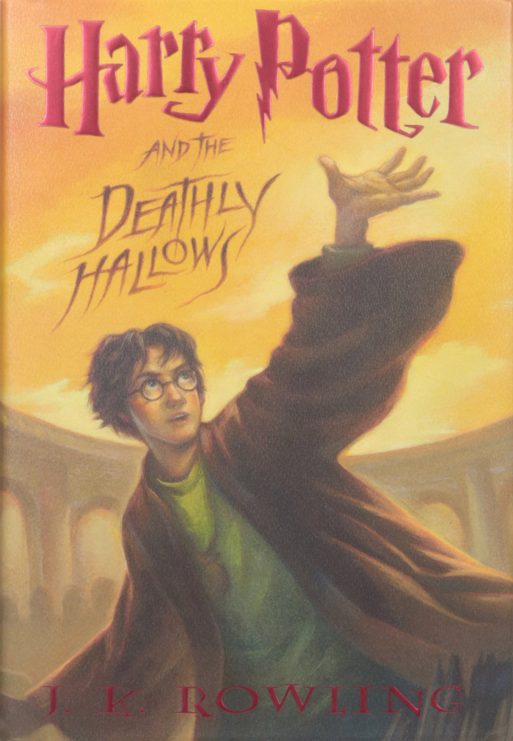 Recently, a part of my childhood “died”; no, thankfully, not a person, but something important nonetheless. Three weeks ago, the final Harry Potter film, “Harry Potter and the Deathly Hallows: Part 2,” was released, bringing an end to the magical series I grew up with.
Recently, a part of my childhood “died”; no, thankfully, not a person, but something important nonetheless. Three weeks ago, the final Harry Potter film, “Harry Potter and the Deathly Hallows: Part 2,” was released, bringing an end to the magical series I grew up with.
The first Harry Potter book came out when I was just seven years old, and I remember devouring it even at such a young age. The final book, Harry Potter and the Deathly Hallows, came out in 2007, and I was about the same age as seventh-year Harry when I read it. As I turned the pages of that epic final volume, I found myself laughing aloud at Fred Weasley’s wisecracks, and in silent tears as various favorite characters of mine met their tragic ends. But as sad as it made me to encounter each new death, I also found myself pleased with the refreshing view of death that colors the book, indeed the series; rather than portraying death as a scary, depressing unknown, it is depicted as a “next stage” in life, an inevitable, but not objectionable, place to go.
The overarching theme of death in the series is perhaps best summed up by the inscription on Harry’s parents’ headstone: “The last enemy that shall be destroyed is death.” Though this is a biblical allusion, its message is not one that is exclusive to Christians; it is one that simply offers an optimistic look at death. Harry himself worries about the line and its meaning, wondering aloud, “‘Isn’t that a Death Eater idea? Why is that there?’” (Rowling 328). But Hermione quickly puts his mind at ease: “‘It doesn’t mean defeating death in the way the Death Eaters mean it, Harry,’ said Hermione, her voice gentle. ‘It means…you know…living beyond death. Living after death’” (Rowling 328). The fact is, the quote could be interpreted in two ways, and it encapsulates the views of Harry’s followers as well as those of Voldemort: While Harry, at the end of the book, comes to terms with death and is ultimately willing to sacrifice himself for the sake of the wizarding world, Voldemort’s main goal is to become immortal- he seeks the Sorceror’s Stone in the first Potter, he splits his soul into seven pieces; but throughout the book, Harry is revered for his courage in his acceptance of death, while Voldemort is reviled for trying to overcome it.
Dumbledore relates this notion to Harry, when asked about what happened to Lord Voldemort the night Harry fled his aunt and uncle’s house: “‘He was more afraid than you were that night, Harry. You had accepted, even embraced, the possibility of death, something Lord Voldemort has never been able to do’” (Rowling 711).
Dumbledore later reiterates this compliment to Harry: “‘You are the true master of death, because the true master does not seek to run away from Death. He accepts that he must die, and understands that there are far, far worse things in the living world than dying’” (Rowling 720-21). Here, death is described as a certainty that is not to be feared; in fact, it is something that one should not view as a bad thing, but rather, something to be grateful for. Dumbledore even goes so far as to say, “‘Do not pity the dead, Harry. Pity the living, and, above all, those who live without love’” (Rowling 722). Thus, death is viewed in a positive light; it is something even better than life itself, and something that should be welcomed, not avoided.
I think this theme is expressed well in the closing line of “The Tale of the Three Brothers,” the fairytale that tells the story of the Deathly Hallows. Of the three brothers, only one used his Hallow wisely, before accepting that he was ready to die: “And then he greeted Death as an old friend, and went with him gladly, and, as equals, they departed this life” (Rowling 409).
Additionally, when Harry is in “limbo” after Voldemort casts the Killing Curse on him, there is symbolism of death as a moving-on point. Harry realizes that he and Dumbledore, who is also present, are at King’s Cross, a train station. When Harry asks Dumbledore where these trains would take him, Dumbledore’s reply is simply, “‘On’” (Rowling 722). Death, from this perspective, is not a dead-end. Rather, it is another point we travel toward, a destination.
Although it may not be the popular view to look at death as something that is, in its own way, a positive experience, it is one that should not be discounted. Death may bring with it sadness, but those that truly accept it and are willing to submit to it are the powerful ones, the strong ones; not the weak ones. So though I’m unhappy that Harry Potter has officially come to an end, I know that I will always carry my memories of it, and I am ready to let it go.

 Harry Potter and the Deathly Hallows by J.K. Rowling
Harry Potter and the Deathly Hallows by J.K. Rowling


 Our Annual Seven Holiday Gifts for Someone Who Is Grieving, 2024 Edition
Our Annual Seven Holiday Gifts for Someone Who Is Grieving, 2024 Edition

 “Hands Up to the Sky” by Michael Franti & Spearhead
“Hands Up to the Sky” by Michael Franti & Spearhead















If ome one needs expert view concerning running a blog afterward i advise him/her to pay
a quick visit this blog, Keep up the pleasant work.
Report this comment